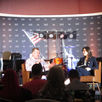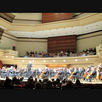Lyric Opera continues Wagner’s monumental Ring cycle with a new production of Die Walküre
- Nov 7, 2017
- 5 min read
Die Walküre, the second opera in Wagner's The Ring of the Nibelung opera cycle, is being staged at Lyric Opera of Chicago.

Time will keep passing, people will be born and will die, but the main aspects of human life will always stay the same. Among them are human relationships, especially in a family where it is hard to hide one’s true nature and feelings. Sometimes, that can result in a family drama. Richard Wagner, one of the most celebrated composers of all time, knew that and reflected all the range of feelings and emotions in his operas. One of them, Die Walküre, the second opera in Wagner’s The Ring of the Nibelung opera cycle, is being successfully staged at the beloved Lyric Opera of Chicago in its new production this November.
“Die Walküre continues the exciting journey this company has undertaken with this Ring, which began so auspiciously last season with Das Rheingold. Our production team’s intention to reclaim the Ring for the theater has proven truly illuminating, and I know their insights will continue to enrich our operagoing as the Ring proceeds,” said Lyric Opera’s General Director, President and CEO Anthony Freud. Directed by David Pountney, one of the great stage directors in the world, Die Walküre has become another gem in the colorful palette of Lyric Opera productions.
It is important to note that this year Music Director Sir Andrew Davis is celebrating his thirtieth anniversary at Lyric Opera by conducting all performances of Die Walküre, which will include one on November fourteenth, the actual anniversary date. With his every move and every emotion, this internationally acclaimed conductor shows his great enthusiasm and love for his profession. Lyric Opera is proudly dedicating the new production of Die Walküre to Sir Andrew to celebrate this important landmark in his career. However, Sir Andrew gets the most significant present for his anniversary at Lyric Opera from his audience, which has been honoring and deeply appreciating his hard work and talent for decades.
The first waves of opera lovers have already attended the first presentations of this great celebration of Wagner’s genius music. The upscale technical characteristics of this complex and long opera haven’t scared them away. Some of the opera goers even come all the way from other states to see this beautiful and breathtaking brand-new production. Its length of almost five hours with two intermissions makes this opera even a more intriguing event as people have to combine their opera admiration with food intakes to have enough energy to empathize with the main characters of the opera.
They do need their energy as the action on the stage makes the audience forget about reality and enter a fantastic world of love, romance, adultery, punishment and even incest. This romantic musical drama in three acts reveals basic human feelings and complexities that, surprisingly, are also possessed by the gods in this story, which is based on the Norse mythology told in the Volsunga Saga and the Poetic Edda. According to Norse mythology, Valkyries are female figures who decide which soldiers die in battle and which live. One of them, Brünnhilde, plays an important role in the opera; more than that, the opera’s name translates as The Valkyrie in English.
The central conflict in Die Walküre evolves between Wotan, king of the gods, and his mortal son, Siegmund. In Act I, Siegmund accidentally falls in love with his own twin sister, Sieglinde, the wife of the brutal Hunding. They were separated early in their childhood and finally met, but found in each other not only relatives, but also lovers. Later in the opera this will raise the wrath of Wotan’s wife, Fricka (goddess of marriage and fidelity), who will convince Wotan not to support Siegmund in his fight against Hunding. Wotan will prohibit his daughter, the warrior-maiden Brünnhilde, to side with Siegmund, but she will not listen. Her disobedience will lead her to a conflict and punishment from Wotan.
Each situation, idea and character in the opera is presented with its own leitmotif that describes various situations and emotions. The singers don’t just sing arias; instead they sing long monologues with beautiful melody lines. Interestingly, Wagner gave the orchestra a special mission not just to support the leitmotifs, but sometimes even to play a leading role in presenting them. These melody lines complement each other while describing the change of actions, moods and feelings on the stage. It is interesting to note that the score is through-composed.
In the new Lyric Opera production, the role of Siegmund is brilliantly performed by Brandon Jovanovich, an American tenor renowned for passionate presentation of his characters and exceptional stylistic versatility. His passion-awakening voice harmoniously corresponds with the touching and sincere notes in the voice of Elisabet Strid, the Swedish soprano who performs the role of Sieglinde in Die Walküre. Her strong voice with tender lyrical timbre impresses audiences around the world. It is a Lyric Opera debut for this internationally acclaimed singer who is already highly regarded by Chicago opera lovers.
The role of Hunding, Sieglinde’s heartless husband, is performed by Ain Anger, an Estonian-born leading bass famous for his passionate presentations of the key roles of the German, Italian, and Russian repertoire. It is a Lyric Opera debut for this talented singer, although he has performed the role of Hunding on many opera stages in the world. The audience can sense his confidence and professionalism in every note and musical phrase.
Act II brings all the depth and richness of the voice of the celebrated American bass-baritone Eric Owens, who brilliantly performs the role of Wotan. His excellent voice quality allows him to reflect all the feelings that Wotan goes through in this opera – starting with love and tenderness and ending with displeasure and anger. Fricka, Wotan’s wife, is presented by internationally renowned German mezzo-soprano Tanja Ariane Baumgartner. Her incredible vocal characteristics allow her to exactly portray the features of Fricka’s personality.
Brünnhilde is Wotan’s favorite daughter. She possesses the same strong personality as her father, or maybe even stronger, which leads her to disobedience. She tries to convince him of her rightness, using sincere, yet confident words and tones in her voice, but Wotan stays firm. Christine Goerke, internationally acclaimed American soprano, demonstrates her great ability to show all the colors of Brünnhilde’s unique personality. This talented singer possesses what’s called a dramatic soprano voice and is highly regarded on many world stages. Her appearance at Lyric Opera in the role of Brünnhilde is another triumph for this great singer who has successfully performed this role in many opera houses in the world.
The exhilarating “Ride of the Valkyries” in Act III brings to stage such talented American soloists as Alexandra LoBianco (Helmwige), Whitney Morrison (Gerhilde), Laura Wilde (Ortlinde), Lindsay Ammann (Rossweisse), Lauren Decker (Schwertleite), Catherine Martin (Waltraute), Deborah Nansteel (Siegrune), and Latvian mezzo-soprano Zanda Švēde (Grimgerde). These brilliant young ladies play the roles of the Valkyries who don’t just gloriously sing, but also ride flying horses, which is possible only on the stages of the most prestigious opera houses and is performed by the most skilled singers.
This production includes many other famous names, as any Lyric Opera of Chicago production. As always, this great center of culture, high aesthetic standards, deep love of music, and extreme professionalism has prepared a fantastic operatic work based on music that has lived through centuries and still raises feelings that we, humans, will live through over and over again until the end of time.
For tickets and information, please call 312-827-5600 or go to https://www.lyricopera.org/concertstickets/calendar/2017-2018/productions/lyricopera/die-walkure-opera-tickets
Natalia Dagenhart
Photo: Courtesy of Cory Weaver

























Comments